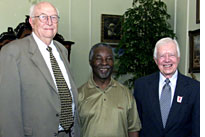Dispatches From Africa

BG: We left Johannesburg at 5:45 this morning, earlier than originally planned so we could make a detour to Cape Town. Late yesterday, we got word that President Thabo Mbeki would be available to meet with us this morning. He was scheduled to be out of the country when we made our initial request, so this was welcome news.
We juggled a few visits around, and prepared to fly south. We learned that Health Minister Manto Tshabalala Msimang was able to join the meeting on short notice. From the Carter Center, President and Mrs. Carter, as well as Dr. John Hardman, director of the Carter Center, would be attending. From the Gates Foundation, Sylvia Mathews, our executive vice president, and Dr. Helene Gayle, director of our HIV/AIDS and TB program, would join my wife Mimi and me in the meeting.
The meeting, which took place at President Mbeki's residence, was a true discussion. We shared what we had heard from students, mothers in clinics, community organizations, and businesses: There is a need for greater urgency and leadership in dealing with this crisis.
President Mbeki and his health minister discussed the efforts the South African government has undertaken. Their view is that they are a doing a lot, including the implementation of a five-year strategy. They feel that the world needs to give them more credit, and as with most things in life, there is truth on both sides.
As we rounded the Cape of Good Hope and flew over Robben Island, where Nelson Mandela and so many others were imprisoned during the apartheid era, I marveled at the coastline and thought about the remarkable transition that this nation has made during my lifetime. If this country could come together to break the chains of apartheid, it can surely come together to reverse the spread of HIV/AIDS.
JC: As we conclude our trip to South Africa, the first of three country stops in Africa, I am optimistic about the potential to address the HIV/AIDS crisis that is ravaging this nation. South Africa has had one of the most rapidly growing epidemics in the world. The toll of the infection—in terms of individual deaths and the number of orphans created—continues to rise.
While we were fortunate to see positive efforts aimed at stemming the tide of HIV/AIDS, the epidemic is still spreading at a vicious pace, and much more needs to be done. The government of South Africa must play a strong leadership role. Unfortunately, the country's leadership is clouded by conflicts around questions of treatment.
Though the country has made some strong efforts—namely the support of an HIV/AIDS vaccine and a concerted public education campaign called loveLife—these highly public controversies over treatment have led to a lack of clarity around the views of President Thabo Mbeki on HIV/AIDS.
While the one-sided nature of these criticisms needs to be acknowledged, we also need to encourage the continuation and expansion of efforts. Success in reducing the transmission of HIV/AIDS has occurred in a number of countries including Senegal, Uganda, and Thailand. Some of these successful efforts include:
- Strong and persistent leadership from all branches of federal and local government
- Sexual health education in school and beyond, including public awareness campaigns that inform people about the causes of HIV/AIDS and the corrective action that can be taken
- Better and more affordable access to condoms and strong encouragement of their use
- Promotion of safe sex among commercial sex workers
- Prevention of mother-to-child transmission of HIV/AIDS including the expansion of programs to provide nevirapine for pregnant women who are HIV-positive
President Mbeki's voice and leadership on aggressively pursuing proven strategies as outlined in South Africa's national HIV/AIDS plan is essential, as is the increased participation of all sectors of society. With the added support of sectors within South Africa, as well as international governments and organizations, this nation and its leadership can become Africa's—and indeed the world's—example for changing the direction of the HIV/AIDS pandemic.